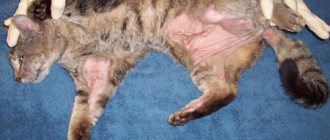Do you have a smelly cat? Cats are generally known for being clean. Most of them are fastidious self-portraits of hairdressers, which keeps them away from dirt and odors. However, sometimes you may find that your cat smells bad. While some cat odors are harmless or easy to fix, others may indicate a health problem.
What makes a cat smell like rotten meat? If your cat smells like rotten meat, it needs to be treated.
As a rule, no foreign odor is felt from a healthy cat; amber appears only during the development of pathology. There are a lot of diseases in which a cat smells of rotten meat or other unpleasant odor.
Most often, a cat smells of rotten meat due to diseases of the oral cavity. These ailments include: stomatitis, pharyngitis, glossitis, tumors in the mouth, papillomatosis, various wounds, cysts.
The condition of the teeth also has something to do with the smell of the animal. Tartar, pulpitis, osteomyelitis, caries, periodontitis - all these pathologies affect the smell. Most often, such ailments occur in animals with flattened faces, the so-called brachycephalic breeds. In young animals, an unpleasant odor may appear due to a delay in changing teeth, as well as due to an incorrect bite.
The smell of rotten meat can be caused by foreign bodies that somehow get into the animal’s mouth. Thanks to them, cracks are formed in the oral cavity, in which food particles remain, which in turn creates excellent conditions for the development of pathogenic flora.
Quite often, a foul odor can be heard from cats suffering from diabetes. In addition, the smell of rotten meat can indicate diseases of the internal organs: liver, kidneys, gastrointestinal tract and even lungs. As a rule, a symptom of any of these diseases is not only an unpleasant odor, but also the cat drinks an excessive amount of water, looks sick, and eats poorly.
If there is even the slightest sign that the smell of rotten meat is associated with the internal organs of the cat, then the animal must be urgently shown to a veterinarian so that he can conduct an examination, diagnose the disease and prescribe treatment.
If a putrid smell appears, this may indicate digestive disorders, so the owner should reconsider the pet’s diet. Feeding low-quality or dry food causes serious damage to internal organs; therefore, it is recommended to switch a sick cat to natural food, which is most suitable for the breed and age of the animal. Neglecting this recommendation can lead to aggravation of the situation, including the development of oncology of internal organs.
Treating an unpleasant odor, regardless of the cause, will require time and effort from the owner. First of all, the veterinarian will suggest taking tests, since it is not always possible to diagnose blindly, based on external signs alone. Also, specialists carefully examine the cat’s oral cavity, and most often the animal is given a sedative, and in special cases, general anesthesia is used.
Diseases of the internal organs are treated under the supervision of a veterinarian, but if the odor comes from tartar, then it can be removed using special gels and brushes, which can be purchased at animal pharmacies.
If there are ulcers or other damage to the mucous membrane, the animal’s mouth is treated with chlorhexidine or another similar antiseptic.
Preventive measures for this pathology include regular care of the cat’s health. The owner must regularly take the animal for examination to the veterinarian, brush the pet's teeth daily and feed only high-quality, natural food.
In conclusion, it should be said once again that an unpleasant odor from a cat cannot appear just like that; as a rule, this indicates some kind of violation, so a caring owner must be wary and show the animal to specialists.
When a cat stinks, there are physiological and pathological reasons. In the first case, the situation is less dangerous, and the unpleasant odor is associated with the diet and characteristics of the pet’s body. If the pet suddenly begins to smell bad, while other unpleasant symptoms and changes in the cat’s behavior are recorded, then this indicates pathology. If your kitten starts to smell, it is recommended to take him to the vet.
The cat's breath stinks of rotten meat: disease prevention
Protecting domestic cats from fleas and worms is the prevention of many diseases. Even if your pet does not leave the apartment, periodically check its fur for fleas. If the cat goes outside freely, use flea collars or drops. Worms can appear in cats from contact with other animals, contact with contaminated food or soil. Why is infection with worms dangerous? By multiplying in large numbers in the body, worms can cause inflammation of the cat’s intestines, the smell of rotten meat from the cat’s mouth, intestinal blockage and even the death of the pet.
It is important to prevent infection with worms by deworming regularly every three months. Every veterinary pharmacy will offer you affordable deworming products for cats.
Fleas, especially during infancy, can cause poor growth and poor appetite in kittens. Sometimes, the health of infected kittens is so poor that their lives are in danger. Small kittens can be washed with flea shampoo; aggressive flea products should not be used.
Usually they fight fleas first, and then worms. The break between these procedures, due to the aggressive effect on the cat’s body, is at least a week. If there is a suspicion of a large number of worms and the cat is not eating well, deworming is first done.
What reasons influence the problem?
Bad odors are observed in an ordinary cat and a sterilized one, and their root cause is not always a pathological condition. If there is a smell of urine coming from under your pet’s tail, this indicates the following factors:
- Incorrect location for emptying the bladder. If a kitten or an adult has a tray that is not the right size, then it is emptied by and the urine remains on the floor, which, with a high probability, the animal will soon step into with its paws.
- Insufficient tray hygiene. When such a cat item is rarely cleaned, soon the cats also stink.
- Low quality toilet filler. It is worth keeping an eye on your cat when visiting the toilet, as some litters do not absorb urine well and it ends up on your pet’s paws. It is easy to get rid of the smell by replacing the litter in the tray with a better degree of absorption.
- Poor placement of the tray. If the owners notice that the cat has urinated in the wrong place, then perhaps this is how he marked the territory or the location of the toilet is simply not suitable for him. The foul odor is caused by the animal stepping on its own urine.
Physiology is the basis of unpleasant odor
Often the problem is resolved after the animal is neutered.
A strong and pungent odor from a pet can be a result of sexual activity or an unbalanced diet. A neutered cat is less likely to smell as unpleasant as an unsterilized cat. During sexual activity, the pet produces urine that smells worse than during normal periods, while it actively marks the house. An unpleasant “aroma” permeates not only the marked areas, but also the animal itself. To solve this problem, they resort to castration or sterilization, after which the pet will stop stinking.
Veterinarians attribute problems in diet to the physiological reasons why kittens become smelly. The smell is caused by an increased concentration of uric acid, due to the large amount of fish in the diet. If even a small drop of urine gets on the fur, the cat stinks very much.
Pathological factors
An unpleasant odor that appears from a cat that has begun to smell like feces or rot deserves special attention from the owners. If a similar “aroma” appears, it may signal some health problems in the animal. When a bad smell appears in the fur area or the cat’s paw smells unpleasant, there are the following pathological reasons:
Sometimes an unpleasant odor from a pet is caused by a skin disease.
- Dehydration of the body. The level of urea in urine depends on how much water the cat drinks. If there is not enough of it, then its concentration increases, which is why the urine stinks of ammonia. Pets with this diagnosis do not live long if they do not receive veterinary care in a timely manner.
- Diseases of the gastrointestinal tract or dental type. In this case, the cat smells of fish or other unpleasant odors in the mouth area.
- Diseases of the urinary system. Stones in the system, inflammatory processes and other pathologies can cause your pet to smell bad. A sterilized cat or neutered cat especially often faces this problem, since after sterilization the risks of stagnant processes increase.
- Hypothyroidism or symptoms of diabetes. After pets with similar diagnoses excrete urine, it has a pungent odor.
- Oncological diseases of different localization.
- Signs of otitis. If a cat smells in the ear area, this indicates an inflammatory process in the ears caused by bacteria.
- Dermatological diseases. Often for this reason, an old cat stinks, whose metabolic processes are disrupted and skin diseases are often recorded.
Normal breath odor in cats
Cats are predators, they need to eat meat and fish, so they always give off a different aroma. But usually it is weak, arising from what has been eaten. In brachycephalic breeds, bad mouth odor is normal. The list includes Scottish, British, Persian and exotic cats. They are distinguished by the shape of the skull - in violation of the normal proportions of width and length.
As a result, their noses are short and flattened, so some of their breathing passes through the mouth. But even with a normal structure of the nasopharynx, the smell can arise due to gastric juice - in sphinxes or due to inflammation of overgrown soft gum tissue in Abyssinians and Maine Coons.
Diseases are rare in kittens, so their breath smells bad when changing teeth. During this period, excessive proliferation of bacteria occurs. The smell disappears after changing teeth to molars. Or the cause is gum injury. Until the soft tissues heal, there will be a smell from the mouth, then it goes away.
In adult healthy pets 1-8 years old, in addition to diseases, the odor is provoked by food (especially raw food), lack of oral hygiene, cheap ready-made low-quality food, or dental problems (chips, plaque, stones).
Older animals have a smelly mouth due to chronic diseases. Old pets are predisposed to squamous cell carcinoma, which is accompanied not only by a stinking mouth, but also by excessive drooling, loosening of the incisors, and the appearance of erosions. Also, as you get older, you start having problems with your teeth. If there are no diseases, then the cause is age-related, hormonal changes, ready-made food, animal food.
What to do and how to deal with the problem?
It is possible to get rid of the unpleasant cat odor after identifying its origin. Sterilized cats require special attention, so the specialist must clarify whether sterilization was carried out. Before selecting treatment for a cat, they review its diet, since the problem is often associated with poor nutrition. It is possible to get rid of the disorder in a pet using the medications indicated in the table.
| Group | Name |
| Medicinal shampoos | "Oksidex" |
| "Baktoderm" | |
| Hexadene | |
| Antibiotics | "Cephalexin" |
| "Clindamycin" | |
| "Ampicillin" | |
| Drops for ear diseases or parasites | "Leopard" |
In advanced cases, when the pet smells strongly and veterinary remedies do not help, surgery is required. A radical measure is prescribed for cancer, serious problems with the kidneys and other internal organs. After the operation, it is necessary to pay increased attention to the cat; it is recommended to feed it tasty and proper food and take care of its hygiene.
>UNPLEASANT SMELL FROM CAT
About cat smell
A healthy and well-groomed cat does not have a pronounced, specific odor. What is commonly called “cat spirit” is the smell of urine - pungent and occurring in the absence of regular cleaning of the room and compliance with hygiene standards. Here the culprit can be considered not the cat itself, but its owner.
If an unpleasant odor begins to emanate directly from an animal that is being monitored and properly cared for, then the reason most likely lies in certain diseases characteristic of representatives of the cat family.
The cat is a hunter, a predator by nature. Therefore, these animals are extremely clean and ensure that there are no foreign odors.
An unpleasant odor should not occur even when your pet's fur gets wet.
Causes
Bacterial infections are mainly caused by bacteria that are a normal part of the skin flora (eg staphylococcus). Because of this, the infection is not contagious to other animals. In cats with allergies, the amount of bacteria on the skin is increased, which can cause red bumps (papules) and an unpleasant odor. With bacterial skin infections, your pet may shed excessively and experience patchy hair loss. The infection can affect the deeper layers of the skin if left untreated. As a result, nodules filled with pus may form on the skin. If the cause caused by a bacterial infection is not identified and eliminated, this can lead to relapses.
Fungal infections cause itching, redness, and an unpleasant odor. Fungal infections most often affect the neck, groin, armpits and perineum. This infection is also most common in animals prone to allergies. In some cats this can be caused by long-term use of antibiotics or steroids, but this does not occur often.
When your cat has an unpleasant odor and you, not knowing what to do, are looking for advice on this topic on the Internet on forums, we recommend not to self-medicate or experiment on your beloved cat. The fact is that there are many reasons for an unpleasant odor from an animal, and the consequences of your experiment may disappoint you and your family.
What does the smell tell you?
Based on the nature of the smell, you can guess the reason for its appearance:
Rotten . Signals problems with the gastrointestinal tract. If you have a disease of the stomach or duodenum, food is retained in the stomach. When it decomposes, hydrogen sulfide and ammonia are released. As a result, the cat belches rotten meat. The owners say it smells like a garbage dump.
Sour. C indicates the presence of worms. At the same time, the cat loses its appetite, becomes nervous, and suffers from constipation.
Acetone. The smell of acetone from the mouth occurs in animals with diabetes. Also, in case of diabetes, a pleasant fruity aroma may come from the mouth.
Ammoniacal. If an animal has diseased kidneys, then its breath attracts attention with the smell of ammonia. Cats with kidney failure experience a range of symptoms: weight loss, weakness, vomiting, frequent diarrhea, and a persistent urine odor from the mouth. Animals with uremia must be monitored regularly by a physician, and most medications are prescribed for life. Another cause of ammonia odor is urolithiasis in cats. The pathology is dangerous primarily due to blockage of the urethra. When urine is retained in the bladder, the mouth stinks of urine or ammonia.
Treatment
Treatment of bacterial dermatitis
Antibiotics (for example, ampicillin, cephalexin, clindamycin, enrofloxacin) are used to treat bacterial skin diseases. There are other methods:
- Local treatment. Shampoos and conditioners containing benzoyl peroxide (eg, Oxidex) or chlorhexidine (eg, Hexadene) may be prescribed. In the area where the bacterial infection is localized, you can use Bactoderm.
- The minimum treatment period for superficial pyoderma is 3 to 4 weeks, and for deep pyoderma - 8 weeks.
Treatment of Malassezia dermatitis
- In severe cases, combination therapy is prescribed. It is important to know that griseofulvin is not effective in treating fungal infections. Ketoconazole, itraconazole and fluconazole may be prescribed to treat Malassezia dermatitis.
- Local treatment is effective in mild cases, but in severe cases, selenium sulfide is usually used (effective in 65 percent of cases).
- Ketoconazole (Nizoral) shampoo is approved in many countries for the treatment of seborrheic dermatitis in humans and is also used to treat Malassezia dermatitis in dogs.
- 2-4 percent chlorhexidine is effective against fungus.
- The use of miconazole or derazol is also successful.
- Rinsing fungal-affected skin areas with vinegar and water is a cheap and effective treatment.
You should bathe your cat using medicated shampoos. Benzoyl peroxide is an excellent antibacterial agent (for example, Oxidex). You can also use other shampoos containing miconazole or ketoconazole (for example, Nizoral).
For effective treatment, shampoo must be applied to the pet’s skin and not rinsed off for 10-15 minutes.
Your veterinarian may prescribe antibiotics or antifungal medications to treat the infection. It is necessary to adhere to all doctor's instructions and take medications regularly.
If your pet has relapsed, you will need to contact your veterinarian for more appropriate treatment.
What can you do at home?
If your cat has bad breath, it is important to understand that treating the animal at home is dangerous. However, the owner needs to examine the pet and try to help him, if possible.
To remove the stench, the root cause must be eliminated:
- If there are ulcers and redness, treat the oral cavity with a solution of Miramistin or a product containing chlorhexidine.
- If plaque is detected, your teeth will need to be cleaned. This can be done with a brush and paste or by wrapping a piece of gauze around your finger. However, if the animal is not accustomed to hygiene from childhood, most likely difficulties cannot be avoided. As an alternative to toothpaste, you can consider special toys. Severe dental plaque can only be removed by a veterinarian.
- If a foreign object is found during inspection, you can try to pull it out.
Sources of unpleasant odor from cats and their prevention
If you suspect something is wrong, it is extremely important to quickly identify the sources of the unpleasant odor. Their prevention directly depends on the causes, or more precisely, the processes that are disrupted in the body of pets.
An unpleasant odor can come from the skin, fur, mouth, ears, etc. It is important to understand that it is not the cat itself that smells, but the fluids that are secreted by the body.
Odor from wool and leather
An unpleasant odor from fur and skin most often appears during or immediately after puberty. Owners of young cats often face such problems. Domestic cats live in unnatural conditions, so they do not have the opportunity to mate when they enter the rut. The body experiences a deficiency, so it begins to produce more sex hormones to attract a partner.
Against the backdrop of raging sexual instincts, young cats begin to mark their territory. The cat's fur and skin acquires a pungent, nutmeg odor. Many owners note that the smell lingers throughout the entire home and is impossible to get rid of.
The only method to solve the problem is timely castration of non-breeding animals and the necessary care for cats that are subject to breeding.
It is important to remember that doctors recommend spaying cats before puberty, because if the pet begins to mark, it can become a habit.
Unpleasant odor from the mouth
An unpleasant odor from the mouth can appear when:
- Diseases of the teeth and oral cavity.
- Chronic and acute diseases of the gastrointestinal tract.
- At the stage of eruption of molars.
If an unpleasant odor appears, inspect your pet's mouth. The teeth should be white, the gums should be pink and firm. If you find any inflammation, it is better to consult a veterinarian. If your cat's mouth looks normal, but the breath has an unpleasant odor, the cause may be an incorrect diet or a gastrointestinal disease.
Note! During the eruption of molars, the gums can form hoods under which food becomes trapped. The leftover food begins to rot, resulting in inflammation of the gums and an unpleasant odor from the mouth.
Strong odor of urine
A strong smell of urine may indicate:
- Incorrect diet.
- Chronic or acute disease of the genitourinary system.
- The hormonal system is not functioning properly.
Some foods can affect the acidity of urine. With prolonged improper feeding of a pet, its urine can oxidize or become alkalized, resulting in a strong and very persistent odor.
In most cases, a strong smell of urine indicates stagnation due to urolithiasis or compression of the ureters. The cat cannot empty its bladder in a timely manner, as a result of which the urine becomes dark in color and has a pungent, ammonia-like odor.
Note! During puberty and/or during the rut, a cat's urine begins to smell stronger.
Ear smell
Unpleasant odor from the ears can occur when:
- The presence of prohibited foods in the diet.
- Inflammatory process (otitis).
- Ear mite infestation.
- Food allergies.
A cat's ears are covered with sensitive skin that secretes large amounts of oil and wax to protect it. If the glands do not work properly, the amount of secretions can increase sharply and lead to an unpleasant odor. Food allergies can also cause overactive mucous membranes.
The most common cause of bad ear odor is improper feeding.
Cats have been known to develop smelly ears when fed sweet or starchy foods. Smoked foods, which affect the functioning of the body's mucous membranes, are also strictly prohibited.
Otitis media can occur due to hypothermia, bacterial infection, injury, etc. Inflammation of the ear canals is detected by pain, restlessness of the cat and redness of the skin. To treat otitis, depending on its severity, ear drops or complex therapy are used.
Note! If your cat's ears smell bad or there is a brown coating on the ear flaps, contact your veterinarian immediately. Most likely, you are experiencing symptoms of an ear mite infestation.
The smell from under the tail
An unpleasant odor from under the tail most often occurs due to blockage or inflammation of the anal glands. The root cause of the disease is hereditary factors or improper feeding.
To eliminate the problem, the cat's anal glands are cleaned in a clinic setting. Afterwards, symptomatic therapy, diet and the necessary examination are prescribed. It is important to remember that if the root cause of blocked anal glands is not addressed, this problem will haunt the cat for life.
Smell from the nose
An unpleasant, sweetish or rotten smell from a cat’s nose indicates a fungal infection of the mucous membranes. If you notice whitish or yellow, thick discharge, the odor most likely comes from pus that has accumulated in the sinuses.
No pet is immune from fungal infection. However, infection with fungi occurs only against the background of a decrease in the body's immune defense. Basic nasal discharge most often indicates infection with a viral or bacterial disease that occurs in an acute form.
Various reasons why a kitten or adult cat stinks
Before looking for symptoms of disease, you should first monitor the quality of care for your pet. You need to make sure that the tray and bowls are clean, as well as personal hygiene. Since nutrition directly affects the cat’s body and health, you should wash the food bowls with soda and wash the floor where they are located. Don't forget that odor varies in nature and can be caused by both internal and external factors.
The following odors may occur:
- Bad breath.
- Bad smell from ears.
- Wool that gives off a bad odor
Smell from the mouth. This is based primarily on the cleaning mechanisms given to these animals by nature. The homemade diet of pets is very different from the natural diet. Therefore, sometimes saliva stops fighting bacteria as actively due to an imbalance in the salivary glands. To reduce the risk of such a problem, you need to carefully monitor your oral hygiene for prevention. This includes regular scaling as needed and the use of dental sticks.
If, despite taking all measures, the unpleasant odor still persists, you should contact a specialist. It is not recommended to resort to self-medication, as this may lead to more serious consequences. In addition, bad breath may occur due to problems of the genitourinary system or stomach. The main thing is not to delay going to the hospital so as not to develop the disease.
Bad smell from the ears. In most cases, this is a sure sign of one of the ear diseases common to cats. Professionals prohibit trying to treat them at home, as this may even lead to deafness in your pet. If your cat shakes his head and scratches his ears more often than usual, and the presence of wax is visible, then this is a serious reason to contact a veterinarian. The occurrence of odor is also possible due to dermatitis or eczema. In this regard, liquid begins to accumulate in the auricle, which can be cleaned with a stick previously soaked in peroxide.
A very common problem is the smell emanating from pet fur. Of course, first of all, this depends on hygiene, but skin and fur are also a direct indicator of the health of the animal. You can judge not only by smell, but also by the cleanliness of the skin, the thickness and condition of the coat and timely shedding.
There is a high probability that the unpleasant odor appeared due to the development of demodicosis in the cat - the appearance of mites that infect the skin. When visiting a veterinary clinic, before prescribing treatment, doctors must take tests to identify the presence of mites on the skin and in the blood.
Hygiene rules for cats
To prevent the appearance of an unpleasant odor, you need to follow the rules of hygiene for cats. First of all, keep the tray clean. If a cat has to go to the toilet in wet sand, the fur may develop an unpleasant odor.
Note! If your cat's fur does not look healthy, has lost its shine, sticks together or falls out, consider this a symptom and contact your veterinarian. If a cat doesn’t wash its fur, it means it’s feeling very bad.
Clean, wash and change the covers on your cat's bed regularly. It is important to remember that a pet is in a constant state of stress if it is unable to maintain its fur at full frequency. Dirty bedding can cause your cat to refuse to rest in its place.
Cats should only be bathed when absolutely necessary. Healthy cats don't need bathing! The exception is animals that regularly participate in exhibitions. To be presented in the best possible light, the six cats are styled with special cosmetics that must be washed off after the show.
Important! Never cut your cat's hair, even if it seems to you that she is very hot! The only valid reason for grooming a cat is veterinary indications - extensive skin lesions, tangles that cannot be eliminated, etc.
A cat’s mouth smells bad – is this normal or pathological?
Cat owners sometimes notice that their pets' mouths have an unpleasant odor. This raises concerns for the health of the animal. But there is not always reason for such fears. Cats may smell what they ate after eating animal food. But this is just a smell, not a stench, which quickly disappears if the animal is healthy. Sometimes the reasons may be associated with diseases of the oral cavity or internal organs, so it is important to find out in time why the cat has bad breath in order to promptly examine it, make a diagnosis and begin treatment.
When to contact a veterinarian
Almost all inexperienced owners make common mistakes that affect the health of their pet. The good news is that the pet’s body quickly responds to correcting errors and returns to normal. Unfortunately, some mistakes can lead to irreparable consequences.
You can monitor your pet for some time, change its diet, living conditions and care methods. However, it is important to remember when to contact your veterinarian:
- Once every six months - a preventive visit to the veterinary clinic.
- A sharp deterioration in the quality of the coat and the cat’s reluctance to take care of itself is a sign of severe apathy.
- Increased or decreased body temperature is a sign of excitation of the immune system in the first case, and anemia in the second.
- Obvious pain syndrome - the cat is hiding, may show aggression or look too depressed.
- Refusal of food for more than a day or categorical refusal of water.
- Unsuccessful attempts to go to the toilet.
- The slightest signs of intoxication.
It is important to remember that Cats live in conditions that are unnatural for them. There are household chemicals and cosmetics stored in your home that can be toxic to your pet. All substances that may affect the cat's health should be kept out of reach. When poisoned, the cat experiences intoxication, and an unusual odor from the skin, saliva or other secretions is one of the symptoms.
Accompanying symptoms
If a smell occurs from the mouth, the owner should pay attention to the accompanying signs:
- lethargy of the animal, apathy;
- refusal of food, water;
- fever, increased temperature;
- the cat wants to eat, but it clearly hurts when eating, he holds his head sideways or tries to take food with the side, where it hurts less;
- inflammation, redness and bleeding of the gums, ulcers on the tongue, mucous membranes;
- nausea, vomiting;
- diarrhea, constipation;
- increased thirst;
- the smell of acetone, urea, sweetish apple often accompanies serious diseases of the internal organs - kidneys and liver.
Strange behavior of the animal, sudden weight gain or loss of weight along with the smell should alarm the cat owner and force him to immediately visit the veterinary clinic.
How to get rid of unpleasant odors in your apartment and home
Having dealt with the problem of an unpleasant odor from a cat, many owners discover that upholstered furniture, floor coverings or other things in the house have acquired an unpleasant odor. Let's figure out how to get rid of unpleasant odors in your apartment and home.
Methods directly depend on goals. If the smell comes from upholstered furniture, you can use a steam cleaner or professional products to eliminate it. Practice shows that the best results are achieved by products designed for cleaning in medical institutions. However, many cleaning products can affect the color and condition of the fabric.
Note! The so-called smell of cat marks is almost impossible to remove, even using professional products. The smell can remain persistent for years, especially with high humidity.
If the area emitting an unpleasant odor is small in area, it can be covered with activated carbon. To prevent black marks from being left at the processing site, the coal can be wrapped in gauze.
Smooth floor coverings can be cleaned with vinegar and soda or special products. Carpets need to be washed, treated with a steam cleaner or sprayed with special products that absorb odors.
Prevention measures
In order to maintain the health of the pet and not face such a problem as an unpleasant, pungent odor from the cat, owners should follow a number of recommendations:
- Maintain cleanliness. Regular cleaning of the litter box, washing and replacing covers on the cat's bedding will prevent even the faintest cat odor from spreading throughout the room.
- Bathe your cat as the need arises, taking into account age, lifestyle, and coat type.
- Take care of the cleanliness of the coat, comb it regularly, inspect the ears, nose, mouth, promptly clearing them of dirt.
Selection of food and proper feeding. No less important than maintaining hygiene standards is proper feeding of the cat. When using ready-made feeds, it is necessary to give preference to high-quality, good products. The use of low-quality industrial feed for a long time often causes an unpleasant odor from the cat’s fur, feces, and also from the oral cavity.
It is completely necessary to exclude foods such as salt, sugar, spices, smoked meats, sweets, and flour products from your pet’s diet.
Feeding such forbidden delicacies often provokes food allergies, damage to the sebaceous and skin glands, leading to the appearance of a foul odor.











